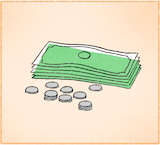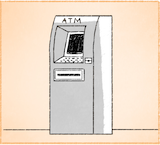


นี้คืออี่หยัง อันนี้เป็นเงิน
อันนี้กะเป็นเงินนั้นหละ หลายบาทซ้ำแมะ วางท้อนกันอยู่หั้น
เทิงมีใบพ้อม เทิงมีเหลียนพ้อม ใบกะหลายใบเอาโลด
แล้ววางท้อนกันอยู่หั้นมีจักบาท กะมีหลายบาทอยู่ อาดสิมีหลายบาทคักอยู่ แนมไปนั้นหลายบาทเติบ เทิงใบเทิงเหลียนเอาโลด
เงินนี้เอาไว้เฮ็ดหญัง กะสามาดใซ้ได้หลายอย่าง เอาซื้อนั้นซื้อนี้ซื้ออี่หยังกะได้ที่เฮาอยากได้
ขั้นเฮามีเงิน เฮาอยากได้อี่หยัง เฮากะไปซื้อได้ ขั้นเฮาบ่มีเงิน เฮาอยากได้อี่หยัง เฮากะบ่สามาดสิซื้อได้ เพาะว่า เฮาบ่มีเงินที่ซื้อเขา [=ซื้อของเขา] เฮากะบ่สามาดที่สิได้ของสิ่งนั้นมา
19
นี้คืออี่หยัง อันนี้กะเป็นทะนาคาน
แล้วทะนาคานนี้เอาไว้เฮ็ดหญัง ทะนาคานนี้กะมีปะโยดหลายอย่าง เฮาสิสามาดไปเฮ็ดอี่หยังอยู่ในทะนาคานกะได้ อย่างเซ้นว่า ไปฝากเงิน ไปทอนเงิน หลือว่าไปโอนเงิน เฮ็ดอี่หยังที่เกี่ยวกับเงิน หลือว่าไปสามาดกู้เงินกะได้ ไปเฮ็ดอี่หยังที่เกี่ยวกับเงินต่างๆ เฮากะสามาดที่สิไปทะนาคานนี้ได้
แล้วทะนาคานนี้มีหลายหม้องบ่ กะมีหลายหม้องอยู่ ทะนาคานนี้กะสิมีตั้งอยู่ซู่หม้องเอาโลด อาดสิมีอยู่ทุกอำเพอ หลือว่าทุกตำบนกะได้ เพาะว่าทะนาคานมันสิไปตั้งไว้อยู่ซู่หม้องเอาโลด
20
นี้คืออี่หยัง อันนี้กะเป็นตู้เอทีเอ็ม
เป็นตู้ไว้ถ้ากดเงิน หลือว่าฝากเงิน หลือว่าโอนเงินกะได้
ญามเฮาสิไปฝากเงินให้คนอื่น หลือว่าฝากเงินใส่บันชีทะนาคานของเฮา เฮากะเอาเงินใส่ไปในตู้นี้ หลือว่ากดนั้นกดนี้ แล้วกะเอาเงินใส่ไป มันกะสิฝากเงินหลือว่าโอนเงินไป
บางเที่ยเฮาอยากได้เงินสด เฮาบ่มีเงินสด เฮากะสิเอาบัดสอดเข้าไปในตู้นี้ แล้วเฮากะกดนั้นกดนี้ แล้วเงินสดกะสิออกมา
แต่ว่าเฮาต้องมีเงินในบัดพ้อมเด๊ บัดทะนาคานนั้นหละ ขั้นเฮาบ่มีเงินในบัด เฮาไปกด เงินกะบ่ออกมา
แล้วตู้เอทีเอ็มนี้มีหลายบ่ กะมีหลายอยู่ ตั้งอยู่ซู่มุมซู่แกเอาโลด จักว่าอยู่ตำบนใดแน่ บ้านใดแน่ อำเพอใดแน่ มีอยู่ซู่หม้องซู่แก ตั้งอยู่ซู่มุมซู่ทิดเอาโลด
Link to overview page
Link to dictionary
| Isaan | Pronunciation | Tones | Thai | English/Notes |
|---|---|---|---|---|
| นี้ | ni: | HF | นี้ | 1. this 2. here |
| คือ | khʉ: | HR | คือ | 1. to be, to resemble, like, as 2. why {บักหล้าคือบ่เก็บโต่ะแน่ = [addressing a young boy] Why haven't you cleared the table?} |
| อี่หยัง | i:-yaŋ | H-M | อะไร | 1. what {นี้คืออี่หยัง = What is this?} {มื้อนี้เจ้าเฮ็ดอี่หยัง = What are you doing today?} {กินเข้างายกับอี่หยัง = What did you have for breakfast?} 2. something, anything, (in negations) nothing {บ่ต้องเฮ็ดอี่หยังอีกเลยนอกจากใส่ปุย = [we] don't need to do anything besides adding fertilizer} |
| อัน | an | M | อัน | 1. thing, object 2. general clf. for objects |
| เป็น | pen | M | เป็น | 1. to be, to exist 2. to be able to 3. to suffer, sth. happens to 4. เป็นหญัง[...]คือ in initial position: why? {เป็นหญังเขากะคือแปงฟัน = Why is he brushing his teeth?} {เป็นหญังเคี่ยงบินมันคือสิตก = Why is the airplane falling down?} |
| เงิน | ŋən | HR | เงิน | money |
| กะ | ga | M | ก็ | 1. then, consequently 2. also |
| นั้นหละ | nan-la | HF-M | นั่นแหละ | auxiliary for emphasis at the end of a phrase |
| หลาย | la:i | M | เยอะ, มาก | many, much, very |
| บาท | ba:t | LF | บาท | 1. baht (Thai currency) 2. unit of weight equal to 15 grams, used for gold etc. |
| ซ้ำแมะ | sam-mɛ | HF-H | (ด้วย)แหละ | final particle used for emphasis Notes: also pronounced ซ้ำแม |
| วาง | wa:ŋ | HR | วาง | to place, to set/put down {โทละสับ/phone: วางสาย = to hang up} {มีเกิบวางอยู่ในก่อง = there are shoes in the box} {มือข้างหนึ่งเขาวางอยู่เทิงโต่ะ = he's put one of his hands on the table} |
| ท้อน | thɔ:n | HF | รวม, ซ้อน, กองไว้ | to gather together, to pile up |
| กัน | gan | M | กัน | mutual, each other, with another, together {เขากำลังนั่งเว้ากัน = they're sitting and talking} {เขาสองคนฮักกัน = they love each other} {ปาสองโตนี้ ใหญ่ห่างกันหลายบ่ = These two fish here, are they very different in size (from each other)?} {ต่างกัน = to be different (from each other)} {ก่องอันไหนหนักกว่ากัน = Which box is heavier (than the other(s))?} |
| อยู่ | yu: | H | อยู่ | 1. to be (located) at 2. yet, still 3. auxiliary indicating continuous or progressive action {ทอดปาอยู่ในกะทะ = (in the process of) frying a fish in the pan} {แม่กำลังเมี้ยนเฮียนอยู่ = mother is cleaning/tidying up the house} |
| หั้น | han | LF | ที่นั่น | there, over there |
| เทิง | thə:ŋ | HR | ทั้ง | 1. up to, all, all of, the whole of, altogether {เขาใส่กางเกงขาสั้นเทิงสองคน = both are wearing short trousers} {เขาเป็นพ่อของลูกเทิงสามคนนี้ = he's the father of these three [children] here} 2. เทิง ... เทิง ...: both ... and ..., ... as well as ... {เทิงมีใบพ้อม เทิงมีเหลียนพ้อม = there are notes as well as coins} Notes: pronunciation: also realized as ทัง |
| มี | mi: | HR | มี | 1. to have 2. there is |
| ใบ | bai | M | ใบ | 1. leaf {ต้นไม้มีใบสีเขียว = the tree has green leaves} 2. banknote {เทิงมีใบพ้อม เทิงมีเหลียนพ้อม = there are notes as well as coins} 3. clf. for leaves, bank notes, helmets, bowls, jars, pots, boxes {ใบบัว = lotus leaf} {ก่องใบน้อย = a small box} {หม้อใบนี้มีฝาพ้อม = the pot here has a lid, too} {ถ้วยใบสีแดง = a red bowl} |
| พ้อม | phɔ:m | HF | พร้อม | at the same time, also, too {มีตะเว็นพ้อม = the sun's out, too} {กะทะมีด้ามพ้อม = the pan has also a handle} |
| เหลียน | li:an | M | เหรียญ | coin |
| เอาโลด | ao-lo:t | M-HF | เอาเลย, ทำเลย, จริงๆ | in final position: intensifier {โตส่ำกะทะเอาโลด = [a fish] as large as the pan!} {เกียบเต็มถ้วยเอาโลด = the bowl is almost full!} {ทะนาคานมันสิไปตั้งไว้อยู่ซู่หม้องเอาโลด = banks are everywhere!} |
| แล้ว | lɛ:o | HF | แล้ว | 1. finished 2. already 3. and then, and next (especially แล้วกะ) 4. auxiliary for past tense |
| จัก | jak | M | จัก | 1. answer to a question: [I] don't know, don't know exactly, [I'm] not sure {พุซายคนนี้เขาเถ้าไป่ จัก จักเถ้าหลือบ่เถ้า เบิ่งบ่ค่อยออก = Is this man here already old? I don't know. I can't see clearly whether he's old or not.} {เขาเว้ากันอยู่ใส จักคือกัน = Where are they talking? I don't know either.} 2. exact(ly), what exactly {จักต้มอี่หยังกะบ่ฮู้ = I don't know what (exactly) he is cooking} {บ่ลู้คือกันจักปาอี่หยัง = I don't know either what kind of fish this is} 3. how much/many? {ต้นไม้มีจักต้น = How many trees are there?} {ตอนนี้จักโมงแล้ว = What time is it now?} {มือของเฮานี้สิมีจักนิ้ว = How many fingers do our hands have?} 4. a bit, a little bit {จักหน่อย/จักหน่อยหนึ่ง = a bit, a little bit} |
| อาด | a:t | LF | อาจ | 1. might, may, will 2. likely |
| สิ | si | M | จะ | future tense auxiliary {เขากำลังสิตื่น = he's about to wake up} {สิไปตะหลาด = [I'm] going to the market} |
| คัก | khak | H | intensifier: very, very much | |
| แนม | nɛ:m | HR | มอง | to look, to glance, to stare {เขากำลังยืนแนมก้อนหินอยู่ = he's standing and looking at the stone/rock} {ข้างหนึ่งแนมเห็น อีกข้างหนึ่งแนมบ่เห็น = [we] see one side, [we] can't/don't see the other side} |
| ไป | pai | M | ไป | 1. to go 2. auxiliary indicating action extending into the future |
| นั้น | nan | HF | นั้น | that, there |
| เติบ | tə:p | LF | intensifier: very, much {เว้ากันโดนเติบ = to talk a long time} | |
| เอา | ao | M | เอา | to take, to give {เขากำลังเอาก่องไปซั่ง = he's taking the boxes to weigh them} {หมอกำลังเอายาให้คนป่วยกิน = the doctor is giving medicine to the patient} {เอาไว้ถ้า = is for, is used for, has the purpose of} |
| ไว้ | wai | HF | ไว้ | 1. to keep, to put, to place, to retain, to save, to reserve {เขาเอาหัวของเขาไว้ใส = Where does she put her head?} {หมาสิเลี้ยงไว้บ้าน = dogs are kept/raised in the house} {ไก่เลี้ยงไว้ในคอก = chicken are kept/raised in a coop} {หน้ามันบังไว้ = the face is covered/not visible} {เขาเอาโทละสับวางไว้หู = he holds the phone to his ear} 2. for {นาลิกาปุกมีไว้เฮ็ดหญัง = What is an alarm clock for?} {หม้อเอาไว้เฮ็ดแนวกิน = a pot is used to make food} {ก่องเอาไว้เฮ็ดหญัง ก่องเอาไว้ใส่ของ = What is the box for? It's for putting in stuff.} Notes: see also ไว้ถ้า |
| เฮ็ด | het | H | ทำ | to do, to make |
| หญัง | ɲaŋ | M | อะไร, เป็นหญัง = ทำไม | 1. what {เขากำลังเฮ็ดหญัง = What is he doing?} {ธูปเอาไว้เฮ็ดหญัง = What are incense sticks for?} 2. something, anything, (nothing) 3. เป็นหญัง[...]คือ in initial position: why {เป็นหญังเขาคือใส่บักพิกลงไปในกวยเตียว = Why is he putting chili in [his] noodle soup?} {เป็นหญังหน้าต่างมันคือเปิด = Why is the window open?} {เป็นหญังมันคือมีควนไฟ = Why is there smoke?} |
| สามาด | sa:-ma:t | M-HF | สามารถ | can, to be able |
| ใซ้ | sai | HF | ใช้ | to use |
| ได้ | dai | HF | ได้ | 1. can 2. to get, to obtain 3. before verb: indicating past tense 4. บ่ได้ + verb: not |
| อย่าง | ya:ŋ | H | อย่าง | type, kind, sort, category |
| ซื้อ | sʉ: | HF | ซื้อ | to buy |
| ที่ | thi: | H | ที่ | 1. that, which {คนที่ยืนอยู่ฝั่งขวา = the person which is standing on the right = the person standing on the right} {เว้าคำที่บ่สุพาบ = to speak words which are impolite = to speak impolitely} 2. for ordinal numbers {ที่สาม = third} |
| เฮา | hao | HR | เรา | 1. personal pronoun: we 2. personal pronoun: I |
| อยาก | ya:k | LF | อยาก | to want, to wish |
| ขั้น | khan | LF | เมื่อ | when, if |
| บ่ | bɔ: | H | ไม่ | 1. no, not 2. question particle, transforming a statement into a question Notes: spelling exception in line with common usage on social media |
| เพาะว่า | phɔ-wa: | H-H | เพราะว่า | because |
| เขา | khao | M | เขา | personal pronoun: he, she |
| ของ | khɔ:ŋ | M | ของ | of, belonging to |
| ของ | khɔ:ŋ | M | ของ | thing, object |
| สิ่ง | siŋ | H | สิ่ง | thing, object |
| มา | ma: | HR | มา | 1. to come 2. auxiliary expressing action towards the present or focal time {กะคุเฮ็ดมาจากอี่หยัง = What is the bucket made of?} {แล้วเขากะเก็บเงินจากพุนั้นมา = and then she takes the money of that person} |
| ทะนาคาน | tha-na:-kha:n | H-HR-HR | ธนาคาร | bank |
| ปะโยด | pa-yo:t | M-LF | ประโยชน์ | 1. benefit 2. useful |
| ใน | nai | HR | ใน | in, within |
| อย่างเซ้น | ya:ŋ-sen | H-HF | อย่างเช่น | for example, such as, like Notes: pronunciation: also realized as อย่างเช้น |
| ว่า | wa: | H | ว่า | 1. that, as {คำว่า X = the word X} 2. to say |
| ฝาก | fa:k | LF | ฝาก | to deposit, to entrust, to place under the care of {ฝากเนี้ยฝากโต = to place oneself under someone's care, to attach oneself to somebody} {ฝากเงิน = to deposit money [in a bank account]} |
| ทอน | thɔ:n | HR | ทอน | to change, to give change |
| หลือ | lʉ: | M | หรือ | or |
| โอน | o:n | M | โอน | to transfer, to remit money {โอนเงิน = to transfer money} |
| เกี่ยวกับ | gi:ao-gap | H-M | เกี่ยวกับ | about, regarding, pertaining to |
| กู้ | gu: | HF | กู้ | to borrow {กู้เงิน = to borrow money} |
| ต่างๆ | ta:ŋ-ta:ŋ | H-H | ต่างๆ | different, various |
| หม้อง | mɔŋ | LF | ที่, แห่ง, บริเวณ | 1. place, area {หลายที่หลายหม้อง = in many places} {หม้องใดหม้องหนึ่ง = some place} 2. clf. for places |
| ตั้ง | taŋ | HF | ตั้ง | to set/put up, to install, to establish, to erect {เขาตั้งนาลิกาปุกตอนสองโมงเซ้า = he sets the alarm clock to eight o'clock in the morning} {พัดลมตั้งโต่ะ = table fan} {ทะนาคานมันสิไปตั้งไว้อยู่ซู่หม้องเอาโลด = banks are [established/can be found] everywhere!} {ตั้งไฟ = to set up a fire} |
| ซู่ | su: | H | 1. all, entire 2. every, any {ซู่พุซู่คน = everybody} {ซู่สิ่งซู่อย่าง = everything} {ไก่ต้องกินเข้าซู่มื้อ = chicken need to eat every day} {ซู่คนสิมีขาเอาไว้ถ้าญ่าง = everybody has legs to walk} |
|
| ทุก | thuk | H | ทุก | every Notes: also pronounced ทุ as in ทุมื้อๆ = everyday, always |
| อำเพอ | am-phə: | M-HR | อำเภอ | district |
| ตำบน | tam-bon | M-M | ตำบล | subdistrict |
| มัน | man | HR | มัน | it (also used to refer to people) |
| ตู้ | tu: | HF | ตู้ | 1. cupboard, cabinet 2. clf. for cupboards, cabinets, ATMs {ตู้เอทีเอ็ม = ATM} {เป็นตู้ไว้ถ้ากดเงิน = it's an [ATM/machine] for withdrawing money} {ตู้เสี้ยผ้า = wardrobe} |
| เอทีเอ็ม | e:-thi:-em | M-HR-M | เอทีเอ็ม | ATM {ตู้เอทีเอ็ม = ATM} |
| ไว้ถ้า | wai-tha: | HF-LF | usually in a positive statement or answer: is for, is used for, has the purpose of {กะทะมีไว้ถ้าทอด = a pan is for frying} {น้ำบักนาวมีไว้ถ้าปุงอาหาน = lime juice is used to season food} {ปากกามีไว้ถ้าเขียน = a pen is for writing} {กะเทียมเอาไว้ถ้าเฮ็ดแนวกิน = garlic is used to make food} {ขาเอาไว้ถ้าญ่าง = legs are for walking} {เกิบเอาไว้ถ้าใส่ = shoes are for wearing} Notes: see also ไว้ |
|
| กด | got | M | กด | 1. to push, to press (down) {กดปุ่ม = to push a button} 2. to withdraw [money] {กดเงิน = to withdraw money} |
| ญาม | ɲa:m | HR | ยาม | 1. period of time {ญามมื้อเซ้า = morning} {ญามเที่ยง = noon} 2. when, while {ญามทอด ต้องใซ้น้ำมันพ้อม = one needs to use oil when frying} {ญามสิออกไปข้างนอกกะต้องใส่เกิบ = when one goes out, ones has to wear shoes} |
| ให้ | hai | LF | ให้ | 1. to give {หมอกำลังเอายาให้คนป่วยกิน = the doctor is giving the patient medicine} 2. for 3. to allow, to be allowed |
| คน | khon | HR | คน | person, people |
| อื่น | ʉ:n | H | อื่น | other |
| ใส่ | sai | H | ใส่ | 1. to put something in/on {เขาใส่บักพิกในกวยเตียวหลาย = he's putting a lot of chili in his noodle soup} {เขาบีบยาสีฟันใส่แปงสีฟัน = he squeezes toothpaste on the toothbrush} {ก่องเอาไว้ใส่ของ = boxes are there to put stuff in} 2. to wear (clothes) {เขาใส่เสี้ยแขนญาว = he's wearing a long-sleeve} 3. directed at {เอิ้นใส่กัน = to call each other/to say to each other} {หมามันเห่าใส่แมว = the dog barks at the cat} {ล้องเพงใส่ไม = to sing into the microphone} {เขากำลังซี้มือไปใส่พุซาย = she's pointing at the man} |
| บันชี | ban-chi: | M-HR | บัญชี | account {บันชีทะนาคาน = bank account} |
| บาง | ba:ŋ | M | บาง | 1. some {สัดบางโตบ่มีขา = some animals don't have legs} {บางคนสิมักกินกวยเตียวแทนเข้า = some people like to eat noodle soup instead of rice (dishes)} {บางสิ่งบางอย่าง = something, anything} 2. thin |
| เที่ย | thi:a | H | ครั้ง, เที่ยว | clf. for times, rounds {บางเที่ย = sometimes} |
| เงินสด | ŋən-sot | HR-M | เงินสด | cash |
| บัด | bat | M | บัตร | card {บัดทะนาคาน = bank card} |
| สอด | sɔ:t | LF | สอด | to insert |
| เข้า | khao | LF | เข้า | to enter, to go inside, to come/go in/on {เข้าห้องน้ำ = to go to the bathroom} {เข้านอน = to go to bed} {ขี่เลียเข้าไปเกาะ = to take a boat to go on an island} |
| ออก | ɔ:k | LF | ออก | 1. to go out, to leave 2. out |
| แต่ว่า | tɛ:-wa: | H-H | แต่ว่า | 1. but 2. only {ฮู้แต่ว่าเขายืนอยู่พุเดียว = I only know that he's standing there by himself} |
| ต้อง | tɔŋ | HF | ต้อง | to have to, must |
| เด๊ | de: | HR | น่ะ, ล่ะ | final particle, can have various meanings, e.g., making a statement softer, or forming a question similar to Thai ล่ะ, or adding emphasis |
| มุม | mum | HR | มุม | 1. corner 2. [figuratively] place |
| แก | gɛ: | M | generic term for area, region, place in semantic reduplications {ซู่พากซู่มุมซู่แกของปะเทด = all parts of the country} {[ATM] ตั้งอยู่ซู่มุมซู่แกเอาโลด = ATMs are everywhere} {ซู่หม้องซู่แก = everywhere} | |
| ใด | dai | M | ใด | 1. which, that one which, what, how {เขานั่งแบบใด เขานั่งขดตะหมาดอยู่ = How is he sitting? He's sitting cross-legged.} {ตอนใด = when?} 2. whichever, whoever {หม้องใดหม้องหนึ่ง = some place, somewhere} {ขั้นเฮาอยากตื่นญามใด เฮากะตั้งเวลาปุกญามนั้น = If we want to get up at a certain time, we set the alarm to that time} Notes: sentence-final often with a marked rising tone |
| แน่ | nɛ: | H | แน่, บ้าง | 1. some, somewhat 2. final particle, used to ask for examples (similar to Thai บ้าง at the end of a question) {หม้อใซ้เฮ็ดอี่หยังได้แน่ = What (different things) can a pot be used for?} {น้ำอัดลมซื้อได้อยู่ใสแน่ = Where/in which places can one buy soft drinks?} 3. final particle, when giving examples {มีเทิงส้งแน่ มีเสี้ยแน่ มีเกิบแน่ = there are trousers, shirts, shoes etc.} 4. final particle, used to give a command {ไปปิดหน้าต่างให้แน่ = Close the window!} 5. final particle, acting as an intensifier, especially in the pattern ... คัก ... แน่ {สูงคักสูงแน่ = very high} {ญ้องเฮาคัก ญ้องเฮาแน่ = [he's] praising me a lot} |
| บ้าน | ba:n | HF | บ้าน | 1. house, home 2. village (also used as a prefix before the name of a village) 3. home country, home region {บ้านเฮาเฮ็ดเข้าจั่งใด = How do we plant rice in Isaan/Thailand?} |
| ทิด | thit | H | ทิศ | direction {ซู่มุมซู่ทิด = everywhere, in every corner [of the country]} |